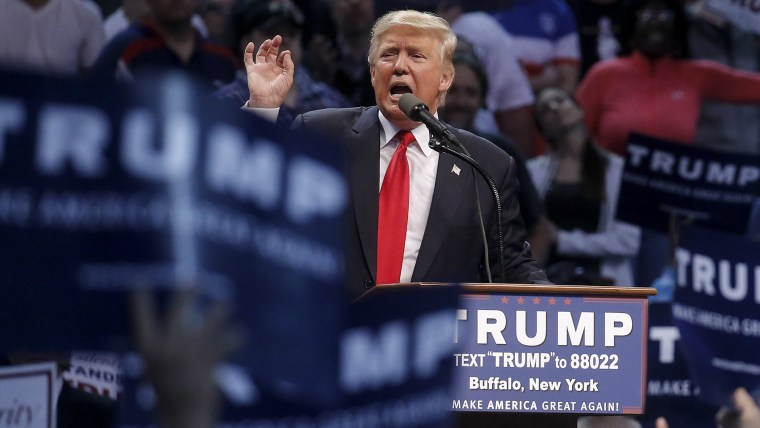For nearly a year, Donald Trump has been pitching a vague slogan: Make America Great Again. Even if we put aside the questions about how Trump intends to do that -- and how, exactly, the Republican candidate defines "great" -- it's a phrase that inevitably leads a question about when America was great, if it's not great now.
Margot Sanger-Katz explained in the New York Times today that Trump's followers don't necessarily agree on an answer, but they have a few ideas.
The slogan evokes a time when America was stronger and more prosperous. But Mr. Trump doesn't specify whether he's expressing nostalgia for the 1950s -- or 10 years ago. That vagueness is reflected by his voters, according to the results of a new survey, conducted online by the digital media and polling company Morning Consult. When asked to select America's greatest year, Trump supporters offered a wide range of answers, with no distinct pattern. The most popular choice was the year 2000. But 1955, 1960, 1970 and 1985 were also popular. More than 2 percent of Trump's supporters picked 2015, when Mr. Trump's campaign began.
The same Times article flagged a Pew Research Center report from last month in which 75% of Trump supporters said life was better 50 years ago. Most Republicans also endorsed the idea, but it was Trump backers who were the most enthusiastic about it.
I don't imagine many will find this surprising, but it's nevertheless a notable validation of a broader thesis. Much of Trump's core base includes older, white men, who've seen generational changes with which they're generally uncomfortable. Over the last half-century, the United States has grown more diverse; women have made great strides towards overdue equality; and the current role of African Americans and LGBT Americans in society would have been difficult for much of the public to imagine 50 years ago.
It's hardly shocking that Trump, pushing a nativist nationalism, has supporters who'd prefer to roll back the clock.
As for what Americans in general consider their country's greatest year, apparently 2000 "was the most popular choice, a preference that cut across political party, candidate preference, gender and age."
In all candor, without giving it a lot of thought, 2000 was my first choice, too. The economy was booming; there was relative international peace; and the nation's reputation abroad was sterling and unrivaled. George W. Bush had not yet taken office, which means we're talking about a time before 9/11, before the wars in Afghanistan and Iraq, before the Great Recession, and before the radicalization of Republican politics reached a fever pitch.
There's plenty of reason to believe we've achieved greatness since -- marriage equality, the Affordable Care Act, etc. -- and have bright days ahead, but is it really that surprising that so many would point to 2000 as the greatest year?
